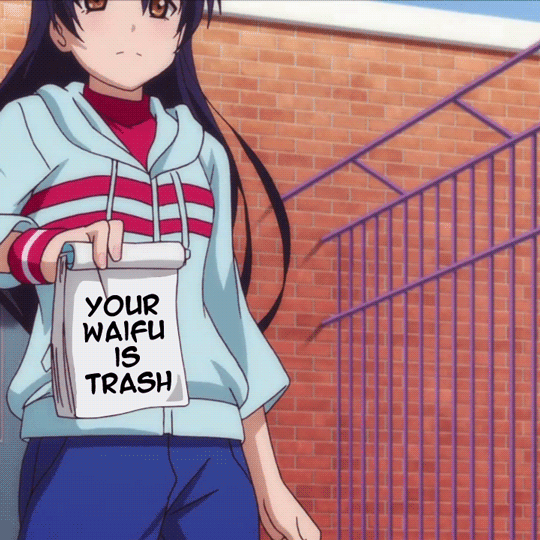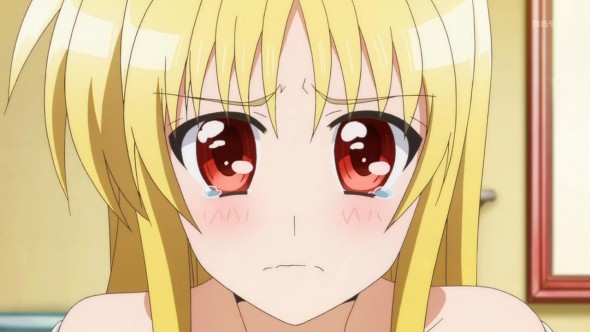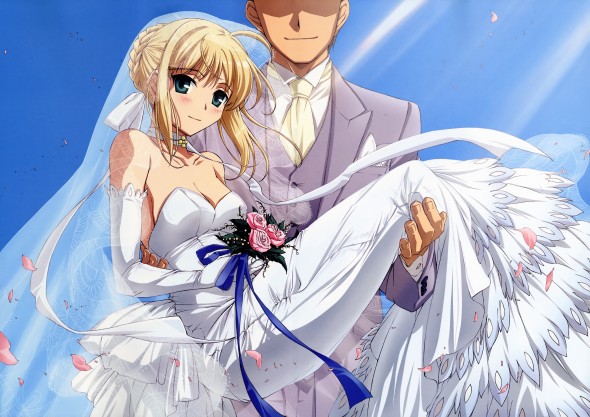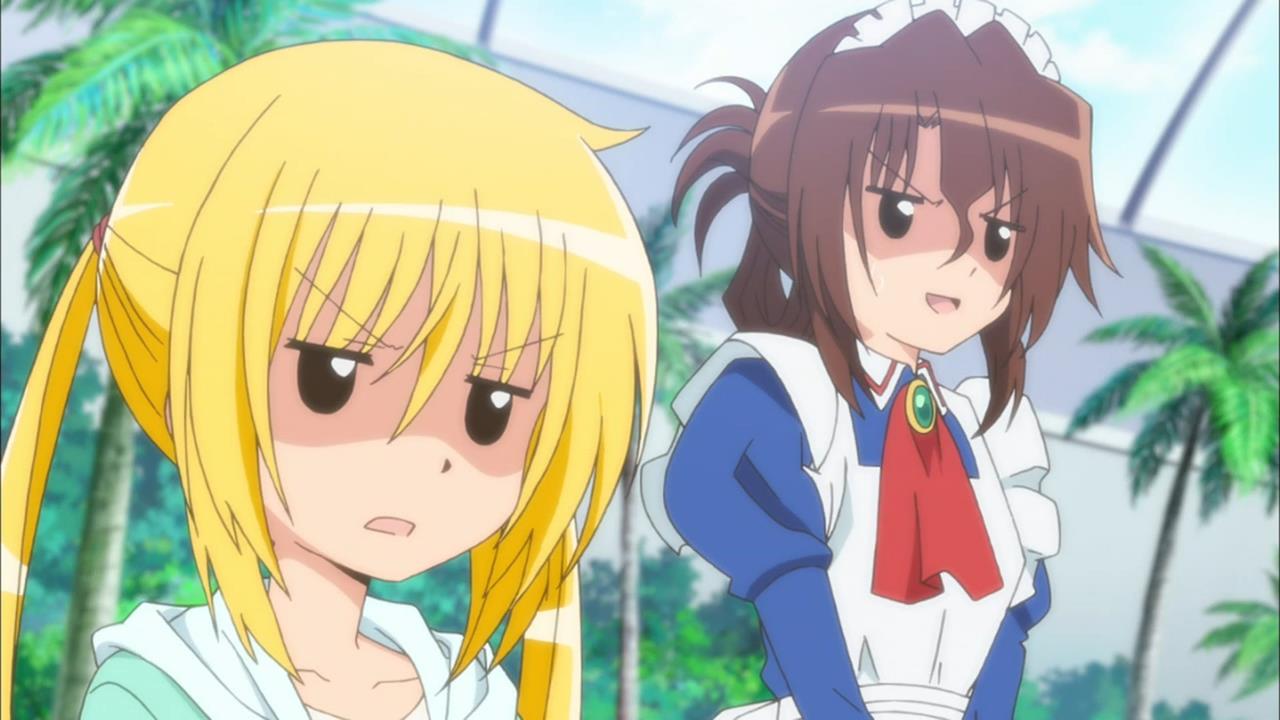The Idiotic “Waifu” Controversy Returns
I really have come to loathe the outrage culture that is in place today in America. Elements of people addicted to outrage have always been there. When I was a teenager, there was no social media to help fuel outrage. However, there were a few outrage groups (usually professing themselves to be Christian groups) whom news organizations loved to trumpet. As such, we would then hear about how these groups would attack offensive things, primarily video games, movies, TV, and of course porn, in the name of having a more moral society.
Today, the outrage culture has grown to an insane level, thanks to social media and a press willing to trumpet much of this nonsense. Social Justice Warriors (SJWs) have mostly replaced Christian groups in attempting to impose morality on the rest of us. (There are some of these Christian groups still around, but they are rather tiny and ignored.) One of the latest (faux) outrage from these SJWs is the use of the term “waifu” by Western fans of anime, manga, and Japanese games.
What is “waifu”?
For those who might be reading this piece who are not anime, manga, or Japanese game fans, the term “waifu” is how the Japanese pronounce the English word “wife”. This is how YourDictionary defines the term.
A fictional character from non-live-action visual media (typically an anime, manga, or video game) that one is attracted to and considers a significant other.
From what I understand, waifu (or more specifically, “mai waifu” for “my wife”) was first introduced to non-Japanese audiences via the Azumanga Daioh anime. The girls discover a photo of an attractive woman, who turns out to be the wife of the ultra creepy Kimura-sensei. See the clip below.
After a while, the term achieved wide-spread usage among fans of anime, manga, and Japanese games. And naturally, this would sometimes lead to debates on what some fans thought of other fans waifu choices. 😉
How the current controversy started.
Although there have been previous attempts to brand the use of the term waifu as racist or misogynist, the most recent online blowup of the term seems to have originated from an Arby’s tweet. (The person in charge of Arby’s Twitter account is clearly an anime/manga fan as they have frequently sent out anime/manga themed tweets.)
Our #DrawThisInYourStyle starts now! The Arby’s Waifu is ready. Draw her in your style & be sure to tag your creation with @Arbys, #ArbysWaifu, & #DrawThisInYourStyle. pic.twitter.com/ck1IQkZ0rY
— Arby’s (@Arbys) March 8, 2019
In addition to the waifu controversy, this tweet also started a controversy on whether the use of a chibi female mascot as a waifu is promoting pedophilia. But that’s a whole other discussion that I’m not even going into here. 🙄
“Waifu” is racist and misogynist!
The reason that loons declare the term waifu is racist is because the assumption is a mockery of Japanese people. Ironically, this is coming from folks who have no problem slamming enthusiastic fans of Japanese things as “weeaboo”. That said, the root of the racism complaint assumes that because “waifu” in Engrish for “wife”, clearly this is a racial stereotype of Japanese people. After all, Japanese people don’t use the term “waifu” for the most part.
As to the misogynistic part of waifu, this is fairly self evident. “Clearly, filthy weeaboo otaku idealizing fictional, 2D women is disgusting, degrading to actual women, and just plain weird.” And some of the folks who are repulsed by the Western use of “waifu” have compared its usage to one of the Japanese terms for wife–kanai (家内). Kanai means “inside the house”.
Are Japanese people offended?
Since I have a number of Japanese folks I’m friendly with, I decided to speak to them about this. I won’t give their names or aliases so that they aren’t harassed. First up is a female, Japanese interpreter who’s sometimes hired to work anime conventions when there are Japanese guests. Her response regarding “waifu” was,
[I’m] not offended at all. Waifuu or okusan. You can say it more likely okusan. Maybe [it is] a generation difference, but at my age, I know some men prefer to use “waifu” instead of okusan, because okusan in kanji means a person who stays inside.
Next, I talked to an editor of lite novels in Japan. (Some minor edits made to clarify the English.)
There is no discomfort at all [by using the term waifu]. That’s because Japanese otaku tend to do exactly the same way. In Japanese, it means the same as “Yome”, that is, “wife” in English. Japanese nerds claim a favorite heroine as “Ore no yome” (= my wife). So I think it would be interesting to know the commonality of Japanese and American otaku.
[This is the first time I heard of] American otaku using “waifu” is instead of “wife”. This is a synonym for so-called “yome” in Japan. I thought it is an incorrect spelling. This fact is not well known in Japan. So, if Japanese people see this notation in English, they might think, “Is this a spelling mistake?”
Next is a Japanese game artist. (Some minor edits made to clarify the English.)
[Waifu] should be widely recognized by Otaku in Japan. I think that there is a generally positive opinion. People who are not interested in anime may be despised. Same as Japanese Otaku. However, I feel that people who say “俺の嫁” (Boku no Yome–my wife) are fewer than before.
Anyway, if you use the word Waifu in America, it has no psychological impact on us. Of course, if you use the word Waifu in Japan, there is no problem.
And my final response comes from a Japanese doujinshi artist. (Some minor edits made to clarify the English.)
There is no negative view [of waifu]. After all the expression “俺の嫁” (Boku no Yome) has decreased recently and the expression “推し” (Oshi–a fan/supporter of something or someone) is increasing. 推し: Recommendation. Strongly recommend it as the best [in Japan]. But in reality they often just point to the characters they like most.
Final Thoughts
I probably shouldn’t get as irritated as I do by things like this. However, over the last several years, we’ve seen this growing movement of SJWs pushing their brand of morality and preaching their dogma on what is and isn’t evil. Frankly, I’m tired of it. Sure, there are elements of the anime/manga fandom that I don’t care for. Guess what? I avoid places with those elements. Or in the case of social media, you can block or mute an annoying person, including me. 😉
Frankly, the people screeching about Western fans using the term waifu are engaged in their own form of anti-Japanese racism and bigotry. The underlying attitude is that the Japanese should be offended by English speakers saying “waifu,” and thus the SJWs have to be protect them and stop this evil. I’ve no doubt that the “righteously offended” will blow off the fact that Japanese people aren’t offended with, “Well, they are just too ignorant to know they should be offended.” 🙄
By the way, if you haven’t watched Azumanga Daioh or read the manga, you REALLY should. Both are quite excellent. I haven’t watched the anime since 2007, so I need to dust off my DVDs and do that.



 March 15th, 2019
March 15th, 2019  AstroNerdBoy
AstroNerdBoy 










 Posted in
Posted in  Tags:
Tags: 
Joey (The Anime Man) did a video on waifus a couple of days ago. It was quite informative.
https://www.youtube.com/watch?v=jFcyZpTKom0
I don’t ascribe to “waifu culture”. I’ve got characters I like for basically any show I’ve watched, but I never had a waifu or husbando. Just seems stupid to me.
Well, to each his own.
[SJWs can go die in a ditch.]
Thanks. Watching this. Hmmm…he seems to be modifying the term “waifu” to be more like “moe.”
I agree, it does seem stupid. And I’m like you–I don’t ascribe to this whole “waifu” thing. I can understand guys (or girls with their husbandos) not having a significant other and thus creating this imaginary relationship with a fictional character. But it is a sad thing to be honest. But a fictional waifu creates a fictional “perfect” relationship, whereas a real woman, no matter how great, is not going to provide that perfect situation depicted in fiction.
That’s why I’m a libertarian. 😁
I remember when I started reading rec.arts.anime.misc one regular
poster claimed a cat-brained cyborg as his wife but he had grown
up to a certain extent in Japan and “Nuku-Nuku, all purpose cultural
cat girl” was one of the programs he watched as a child.
I don’t recall if he used waifu in his English language posts to
the news group or not but he is missed for his antic sense of
humor, by me at least,
But no slurs against the Japanese were intended,
bliss
Haha! I remember him as well. Was it “Ethan Hammond”? (I had to look this up ’cause I couldn’t remember his name.) I always liked his *shakes fist* stuff he’d post. Man, I feel bad for not remembering you from back then. 😅😅😅 Those were good times for sure. (And man are we getting old. 😅)
And none are taken ’cause they don’t see it as a slur. 😁
I’ve never seen anything negative about it until today. I always thought it was based on a katakana pronunciation of the English ‘wife.’ I was a little annoyed by the things I read because they say the use of waifu and husbando are bad, but not the butchered anime character screen names they use.
Yeah, the cancel culture likes to go after stuff like this. Had I not been so insanely busy of late, I would have done a couple of pieces, one on Akamatsu-sensei (UQ Holder) warning about Western pressure to change anime/manga to fit woke ideology and the second on how some in the American comic book industry loathe how anime/manga, with their “problematic content” are dominating graphic novel sales.
Riteru gireta satirikas againe!
I am japanese american and recently started calling my italian america gf waifu. She loves it. We both love anime and japanese culture. I dare someone to try and tell me this is somehow wrong, racist or mysogynist. I love this article. SJWs really are the offensive ones.
Akamatsu-sensei won political office in Japan, campaigning in part against the push from the wokesters in the West, who are attempting to pressure Japanese publishers to change anime and manga to meet woke standards.
Speaking as a Japanese, I don’t want you to use WIFU
For different reasons than the subject of this article.
Wifu is a word based on the Japanese accent
They are fully aware of the original meaning (wife), as the word hasbando was created later, but to create a new word based on jpaccent instead of treating it as a mere accent is unknowingly teasing and discriminatory.
In the English-speaking world, there are very few Japanese, so this kind of unknowing discrimination and teasing is rampant.
I don’t see how “waifu” is discriminatory any more than “anime” is, as it is a Japanese remake of the English word “animation”. Some try to make the case that the term is racist, but I reject that.
On the other hand, official English subtitles removing Japanese honorifics can easily be seen as racist. Further, since official English subtitles will use other Western honorifics from Spain, France, Germany, etc., you could say that is not only racist, but discriminates against the Japanese.
WIFU is WIFE with a Japanese accent.
It comes naturally when a Japanese person speaks it.
Japanese people originally want to say “wife”, but it is discriminatory to make another word based on the accent while understanding the meaning of “wife” and without understanding the will of Japanese people.
Now let’s reverse the analogy.
The Japanese word “karaoke” is pronounced like “carry okayy” by English speker.
It is pronounced like carry okayy
If you can’t pronounce karaoke correctly, let’s take you to a curry shop
If you can’t pronounce sushi in a sushi restaurant as it is pronounced in Japanese
Let’s serve gumi which is similar to sushi
Are these not discriminatory?
While understanding the meaning of the original words they want to say, but intentionally take them as different words because they are accent It’s clearly discriminatory
If we are talking languages, the Japanese butcher English worse than Americans butcher Japanese.
As to the term “discriminatory”, that’s not happening.
> making or showing an unjust or prejudicial distinction between different categories of people, especially on the grounds of ethnicity, sex, age, or disability.
Not pronouncing words correctly isn’t discrimination.
I haven’t been on this site in a month.
I’m afraid you still don’t get it.
It is discriminatory to not treat Japanese accented English as it has always meant, but to create and replace it with another word that means something else
WIFU is “waife” with a Japanese accent and has no other meaning.
To replace it with another word is not treating Japanese English as English
Even if you have a Japanese accent, it is still English.
If they understand what they are trying to say, you should respect that
Replacing one accented word with another is discrimination, no matter how much you try to excuse it
Singaporean English and Indian English also have strong accents.but
I have never heard of them being treated as words with different meanings.
At least we Japanese can no longer say “wife” in English with a Japanese accent